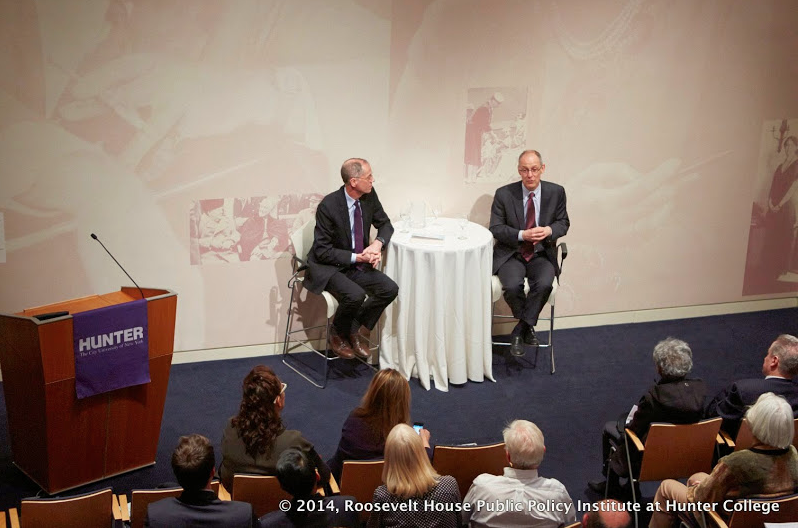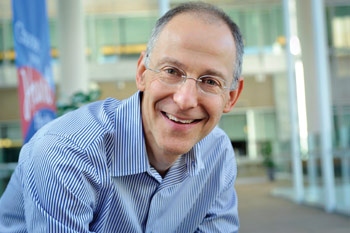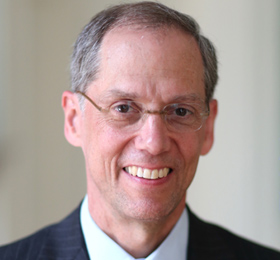PROGRAM
Roosevelt House hosted a book discussion featuring Ezekiel Emanuel, author of the just-published Reinventing American Health Care: How the Affordable Care Act Will Improve Our Terribly Complex, Blatantly Unjust, Outrageously Expensive, Grossly Inefficient, Error Prone System — an authoritative look at the state of American health care today. Ezekiel Emanuel, former special adviser on health care to President Obama, was interviewed by Thomas A. Farley, former commissioner of the New York City Department of Health and Mental Hygiene and the 2014 Joan H. Tisch Distinguished Fellow in Public Health at Hunter College. Introducing the conversation was Barbara Glickstein, co-director of the Center for Health, Media and Policy at Hunter College and Senior Program Director of Interprofessional Training and Education at Cornell-Hunter (ITEACH).
Ezekiel Emanuel’s Reinventing American Health Care offers a comprehensive diagnostic explanation of why health care in America has become such a divisive social issue, exploring how money and medicine have their own — quite distinct — American story, and why reform has bedeviled presidents of the left and right for more than one hundred years. Dr. Emanuel, currently a professor of medical ethics and health policy at the University of Pennsylvania, and Dr. Farley discussed the ways in which the Affordable Health Care Act of 2010 is reshaping the health care system now, Dr. Emanuel’s forecasts for the future, and what trends are shaping the market for health care to 2020 and beyond.
SPEAKERS
Ezekiel J. Emanuel
Ezekiel J. Emanuel is Vice Provost for Global Initiatives and chair of the Department of Medical Ethics and Health Policy at the University of Pennsylvania. From January 2009 to January 2011, he served as special adviser for health policy to the director of the White House Office of Management and Budget. Barbara Glickstein may moderate; her participation is confirmed but her role is TBD. Glickstein is Co-director, Center for Health, Media & Policy and Senior Program Director, Interprofessional Training and Education at Cornell-Hunter (ITEACH) at Hunter. She is also producer and host of “Healthstyles” on WBAI Pacifica Radio 99.5 FM NY.
Thomas A. Farley, M. D.,
Thomas A. Farley, M. D., the 2014 Tisch Distinguished Fellow in Public Health at Roosevelt House, was Commissioner of the New York City Department of Health and Mental Hygiene. He advocated for groundbreaking public health policies in New York City, including making the city’s parks and beaches smoke-free, prohibiting price discounting of cigarettes and raising the legal sales age of tobacco to 21, among other initiatives. He also introduced letter-grading of restaurants based on sanitary inspections, which led to improvements in restaurant cleanliness and a decline in the city’s rate of salmonella infections. During Dr. Farley’s tenure, as a result of these and other programs, mortality rates fell sharply and life expectancy rose far more quickly in New York City than in the rest of the nation.
A pediatrician by training, Dr. Farley began his public health career as an Epidemic Intelligence Service Officer with the Centers for Disease Control and Prevention (CDC). He later served as a medical officer at the Louisiana Office of Public Health and after that was chair of the Department of Community Health Sciences at the Tulane University School of Public Health and Tropical Medicine.
Dr. Farley earned his medical and public health degrees at Tulane University. He is widely published, with articles featured in leading medical journals, and his body of research covers a wide range of topics, including Legionnaires’ disease, prevention of HIV/STDs, infant mortality and obesity. Dr. Farley is coauthor with RAND Corporation Senior Scientist Deborah Cohen of Prescription for a Healthy Nation, published in 2005 by Beacon Press, which explains how changes in the physical and social environment can improve health and counter the leading causes of premature death.
Barbara Glickstein
Barbara Glickstein, RN, MPH MS, a Faculty Associate at Roosevelt House, is a health journalist and public health nurse and Senior Program Director of Interprofessional Training and Education at Cornell-Hunter (ITEACH). Ms. Glickstein is co-founder and co-director of the Continuum Center for Health and Healing and the producer and host of Healthstyles on WBAI Pacifica Radio. She has produced programming for Martha Stewart Radio and was a fellow at the Women’s Media Center in 2009. She also creates strategic partnerships, using new technologies to create social change, and advises individuals and organizations on strategic development.
EVENT SUMMARY – Reinventing American Health Care
Now that the Affordable Health Care Act of 2010 – otherwise known as “Obamacare” – is the law of the land, the appearance at Roosevelt House on March 23, 2014 of Ezekiel Emanuel, “one of the architects” of the law – not the architect as he joked conservative pundits often target him as having been – was especially timely. He talked about his book, Reinventing American Health Care, with Thomas A. Farley, MD, MPH, former Commissioner of the New York City Department of Health and Mental Hygiene and the 2014 Joan H. Tisch Distinguished Fellow in Public Health.
The evening was introduced by Roosevelt House Faculty Associate Barbara Glickstein, Co-Director, Center for Health, Media & Policy, and Senior Program Director, Interprofessional Training and Education at Cornell-Hunter (ITEACH), Hunter College City University of New York. Professor Glickstein welcomed both Emanuel and Farley as key figures in shaping current debates about health care and the opportunity their conversation provided to address the many issues surrounding the new health care law and its implementation and future promise.
“The AHCA is not perfect,” Professor Glickstein, also a registered nurse, acknowledged. “It has only been four years.” Progress will be “slow and steady.” The number of uninsured has already fallen, Gladstein pointed out. This is a major step forward, she stated, not to be underestimated, and the law’s emphasis on prevention, and on recruiting young enrollees, are essential.
Dr. Farley asked Dr. Emanuel to explain his involvement in the development of the ACHA. “Conservative TV shows often refer to me as ‘the architect,’” he said, “but the ACHA had literally hundreds of people involved.” Farley responded, “We can’t blame you”; and Emanuel said of his involvement while working with a small team at the Office of Management and Budget, that he wanted a “national exchange” rather than state exchanges. “You can see how good a predictor I am.”
Emanuel remarked that he wrote his new book because he wanted to read it; he had looked for a book that would “explain the American healthcare system” and the ACHA, and joked that the “reason there is no such book” is that a tenured academic thinks the book is “beneath” them because it would not be theoretical enough in approach; and an untenured academic wouldn’t get tenure for writing one, for much the same reason. “So no one writes it.”
The book takes as a given that the American health care system is deeply flawed – a view signaled in the very long and comprehensive subtitle, “How the Affordable Care Act will Improve our Terribly Complex, Blatantly Unjust, Outrageously Expensive, Grossly Inefficient, Error Prone System.”
Why is our current system “not that great?” Dr. Farley asked.
“It is remarkable to me how short memories are,” Emanuel replied. “There is a very good reason we passed health care reform…. There was widespread agreement it didn’t work. Even John McCain had a proposal in the 2008 election… When Republicans are proposing fixes, you know the system is really broken.”
It is, he said, “the most expensive per person system in the world.” People on all sides of the issue “may not agree that the ACHA fixes it, but everyone agrees it is broken.” The system is riddled with, even driven by, extravagant waste, which the law is designed to help bring under control.
“Where does all that waste go?” Farley asked The dilemma, Emanuel said is a familiar one: “To someone’s pocket. Which is why we can’t get rid of it. We pay a lot higher prices, for devices, drugs, for hospital days” and other elements of the system, including administrative costs. Simply “to pay an insurance bill” requires high administrative costs. “And we’re all to blame,” Emanuel said, referring to doctors, patients, hospitals, insurance companies. The general public, Emanuel said, usually blames drug companies or insurance companies for waste. But insurance company profits are about $20 billion a year for all insurance companies combined, “a small amount [in] a three trillion dollar system” amounting to no more than “pencil dust.” For this reason alone, Emanuel said, it is “not beneficial to point fingers.”
As Dr. Farley interjected, “One man’s waste is another man’s profit.”
The past was prologue to the current debates over how best to minimize waste, Farley believed, asking why did HMO’s not “take over” as predicted, in the 1990s? It was only a short-term fix, Emanuel offered: “That lowered prices for five years” – the only five years of the post-World War II era “for which we had cost control. But they didn’t do it in a smart way. It was mainly saying no – Just say no.” HMO’s just “refused to pay the bill…. So people got pissed. Enough pressure built up” and that led to their undoing.
The future, Farley and Emanuel agreed, will include a merging of hospital companies and insurance companies in the sense that health care systems will provide their own comprehensive insurance plans; we already see that insurance companies are buying hospitals, Emanuel pointed out.
His book was also written, Emanuel said, to “correct some myths,” Emanuel stated. “The bill is not 2400 pages.” It is a substantial 940 pages – but this “about the size of Stephen King’s latest novel and shorter than War and Peace.”
The system we have now, with employers offering health care “serves a function – “pooling.” Employers have not been required to provide insurance; they do it because it offers a competitive reason for employees to work there. “Now,” with the public health exchanges, “there is an alternative.” Many employers want to be “out of the insurance business.”
He predicted that with “Evolution” there will be a greater openness to using the exchanges (apart from any problems that may exist with the ease of use of the sites). Young people buy everything on the web, from airline tickets to almost everything except real estate. The future, therefore, will be “A different equation.” Using his 30-year-old daughter as an example, Emanuel pointed out she uses the web as a purchasing tool without second thoughts. To that end, “we need to work on” the simplicity of the sites – he said the goal should be to make them as easy to use as “REI, or Zappos.” In the future, with this evolution, the purchasing of health care will be different. Today, most employees have “no choice,” about the health care options they get through work, but “the dynamic changes once you have a functioning exchange.”
To those who would underestimate the impact of the penalties for the young not carrying insurance, Emanuel emphasized: “The penalty is 95 bucks or 1 percent of income,” up to a certain level, and 2% of income. “Plus you don’t get any insurance at $700” – if you make $35,000 in annual income. Studies have shown, he said, that “most young people are deterred” from buying insurance, “not because they think they’re young and invincible; it’s because they can’t afford it, given the fact that they start out at lower incomes.” On this point, he faulted the rollout of the law: “The problem is the communication strategy” hasn’t made clear there are subsidies for low-incomes are available. This must improve.
Overall, Emanuel said, he is “Optimistic” about cost control in the future.” Very soon, “There will be zero growth against GDP” – a reverse of the trends of the last 50 years. “How can you save money by caring for people with chronic illness?” Farley asked By “focusing on them when they’re well,” Emanuel stated, to Farley’s agreement. “By keeping them out of the emergency room.”
Both doctors agreed that if we are able to reduce use of the emergency room and hospitalization; and reduce readmissions – if the law is successful in incentivizing doctors to keep people “out of the hospital,” these efforts “can lower costs by 20%” – and “that is the wave of the future. People are healthier and they get sick less frequently,” Emanuel stated. “If you have a high readmission rate, you lose money.” Emanuel pointed out that readmission is already down 2 ½ percent – “not a home run,” but he forecast that this will continue to improve, and predicted lower readmission rates of 15 percent over time.
Emanuel stated that improvement of the law is necessary but unfortunately may be politically impossible. “If we had stood on principle” and waited for “single-payer” we would have no reform, he said. “That’s not the system we have, that’s not the politics we have.” As far as the single-player plan he personally would have liked, “We got nothing. This is the best we could do.” And even without single-payer, he pointed out, it was not “an overwhelming vote…. The worst thing we could have done in 2009 and 2010 was do nothing…. I’ve said over and over again, it’s a B-bill…. But give up perfection,” he advised. “Massachusetts made six corrections after introducing their health care reform, which is what we should be doing,” he said. But, he added, “We don’t live in a time of normal politics… That’s what we should be doing.”
One potentially unforeseen response to the ACHA, Farley pointed out, has been that hospitals have been merging. Why? Farley asked. Emanuel thought it was advantageous: “It all depends on how big they get. You do have to enforce anti-trust rules… We should have more enforcement than we’ve had hitherto…. I do think too big is not good,” though some merging is helpful and important, when coordinated services and facilities are combined. “Health care is one of those things that you’re never done. You’ve got to be constantly working at it and reforming it and making sure the structures don’t ossify.”
In his view, Emanuel said, the ACHA is only “one part of the health care reform we did in the White House,” and he praised the influence of the First Lady’s Let’s Move initiative. “I always viewed these as complementary,” adding that the issues Farley focused on in New York City were also of a piece with Mrs. Obama’s focus on obesity and other issues. Obesity is a “public health issue,” Emanuel stated, “not one to be dealt with in a doctor’s office.” The Let’s Move initiative has “completely changed the conversation” in the country. The first lady “does affect the market.” It’s not a question of “just health reform, but everything the administration has tried to do around health.”
But public health funding, Dr. Farley pointed, out is not an entitlement like Medicare or Social Security, and though the ACHA called for expanded spending on this, in practice it is often reduced. “I’m optimistic about public health in general going forward in two respects. One is the employer side… wellness programs … are on a long term basis” going to make a difference, Emanuel said. It is “a double-edged sword because it can be used to discriminate against people,” he said, but on the other “Employers are going to have an interest in wellness” because of disability insurance and other cost-related factors, even if, as Emanuel predicts, many “employers stop providing insurance directly.”
The evening concluded with Dr. Farley’s praise, “The book is great,” a look at American health care by “One of the few people who understands the system.”
RESOURCES
- John Harwood: "In Book, Architect of Health Law Predicts a Shift Away From Employer Coverage" (NYT)
From the New York Times: March 20, 2014
- Emanuel: "Comparing Obamacare to Its Alternative" (NYT)
From the New York Times: January 28, 2014


























